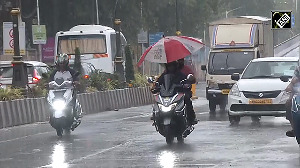'It is a political failure, and not a medical failure.'

When the virus first appeared in India, Kerala was one state that tackled it quite well, and its efforts were appreciated in India and globally.
That was in April.
Come October, the situation has changed completely.
On Saturday, October 11, when it registered 11,755 cases, Kerala surpassed Maharashtra and Karnataka in the daily tally of Covid cases.
This was after having just one case early May, and the state authorities claimed then that they had flattened the curve!
Five months later, the number of cases rose to more than 11,000!
What is the reason behind this surge?
Dr S S Lal, a public health expert based in the US, explains to Shobha Warrier/Rediff.com the reasons for this spurt in coronavirus cases.
Dr Lal, below, vice-chair of the WHO-TB Working Group who has just been appointed president of the All India Professionals Congress's* Kerala unit, says, "There was no testing for people coming in through the land borders. This is where Kerala failed. Only at the airports, there were checks."
As a public health expert, what do you think changed in the last five months?
It is a fact that Kerala is compared with the developed world in matters concerning health. But it is a myth that Kerala tackled the cases well in the beginning.
Myth?
Yes. There were only 2-3 cases then, and the state did a good job of taking care of them.
And they started talking about how successful they were in containing Nipah year before. But Nipah was not a highly contagious disease like Covid. This was portrayed as a big victory. There was a kind of euphoria among the state health authorities. Then, they contained the 2-3 corona cases. So, the euphoria continued.
They went on to say that no virus was a problem for Kerala. This kind of an attitude made people relax.
You mean the people of Kerala or the health authorities?
The authorities gave a wrong message to the public, and that made them complacent.
Kerala should have used the time to prepare when the virus was spreading in Europe and the US.
I have been saying from the beginning that Kerala should be careful as this is an unknown disease and it is spreading rapidly.
Public health experts cautioned the health minister that we should not be celebrating. But the government ignored our warnings. They were busy collecting awards.
They went on to say that they would send their health inspectors to New York to save New York! At that time, I had told them that Kerala was going to be like New York soon. But the government ignored our warnings completely.
Till today, the government has no strategy for combating Covid.
Compared to many states, Kerala had a very harsh lockdown.&
It was good initially. But they did not do anything in the borders.
Is that not the case with all the states? Every state has borders.
There was no testing for people coming in through the land borders. This is where Kerala failed. Only at the airports, there were checks.
Then the government did not engage all the healthcare professionals. In Kerala, 80% of the doctors and 80% of the nurses are in the private sector. And more than 70% of the people are dependant on private healthcare.
That was why from day one, we were saying, the government was only reaching out to 20% of the people.
Organisations like IMA (the Indian Medical Association) have a wider reach, but the government did not engage IMA at all. On the 3rd or 4th day, the president of IMA was not allowed to be present in the technical committee. The chair of the committee was not a public health expert, but a neuro surgeon.
There was criticism that Kerala used the help of the police to fight the virus, and not health experts. Is it true?
Yes. It was a very wrong step taken by the government.
Initially they said there was no epidemic in Kerala. When the cases went up, they tried to hide it.
When they found that it was going beyond their control, they said the police would handle it. When the police entered the scene, people got scared.
Healthcare professionals know how to approach and counsel people.
Would you say the state authorities messed it up?
They messed it up completely.
They said the private sector would loot people. When there is a calamity, there is no public or private sector; there is no public or private virus.
The government should engage everyone and see to it that they do not loot people. They should see to it that people below the poverty line are not charged.
In Tamil Nadu, a majority of cases are taken care of by government hospitals while the private sector is charging in lakhs.
 In Kerala, 80% of the people use the private healthcare system.
In Kerala, 80% of the people use the private healthcare system.
Take the case of the Trivandrum medical college. There are 1,500 people admitted there, out of which 600 are Covid patients. These Covid patients are in a serious condition needing help, but bystanders are not allowed for them.
The superintendent of the medical college wrote 10 letters to the CM in the last three months that they needed 1,700 extra staff, but nothing was done.
The current recovery rate in Kerala is 65.39% while the national average is 83%. It was 93% in May. What changed in these five months?
In Kerala, they do a final test before the patient is sent back. They discharge the patients only if they test negative.
Actually after 10 days, you can discharge them. The final test is unnecessary, but Kerala wants to do it very systematically. That is why the recovery rate is lower than the national average. It is not that the situation is bad; it is quite good.
In Kerala, the death rate is very low.
Even though it is a geriatric society?
Yes. That is because people are very health conscious. From our study, we found out that 80% of the people here are using masks.
Not only the mortality rate, but the percentage of people becoming severely ill also is less in Kerala. And it is not because of the government but because people take care of themselves better.
Then, why is it that the number of active cases per million is the highest in Kerala? Reports say that while the number of active cases declined in 23 states, it has doubled in Kerala.
If there are more active cases, it means new infections are more. But those who becoming seriously ill is less.
It is not a medical failure. Health system in Kerala is good, doctors are good, health inspectors are good.
Then what do you attribute to the number of cases going up?
That is because of the political blunder. Initially it was not alarming. The government did not bring all the partners together; they tried to do everything all alone, and failed miserably.
They are not doing enough number of tests. They are not involving the private sector in the Covid fight. They are not transparent; they hide the numbers.
First, they were in denial, then they started blaming the others. For example, they blamed those who lived outside for spreading the disease.
That's why I say that it is a political failure, and not a medical failure. Even now, they are saying that we are number one in the Covid fight.
There is going to be an assembly election next year. That's why every day the chief minister at his press conference talks about Covid for five minutes and the remaining 90 minutes, politics.
Those who were listening to medical professionals are winning. Even in Trump's land, scientists can say, the government is wrong. But here in Kerala, you cannot criticise the government.
When I said the health system was infested with maggots, the health minister was livid with anger. She called me an American because I work there. She said that a doctor who could not control cases in America need not tell us what to do.
Were you criticising as a public health expert or as a person associated with the Congress party?
I am both. Though I will not make any public health statement based on my political allegiance, I have my own politics.
*The All Indian Professionals Congress is an Indian National Congress-affiliated organisation, headed by Dr Shashi Tharoor, MP.











